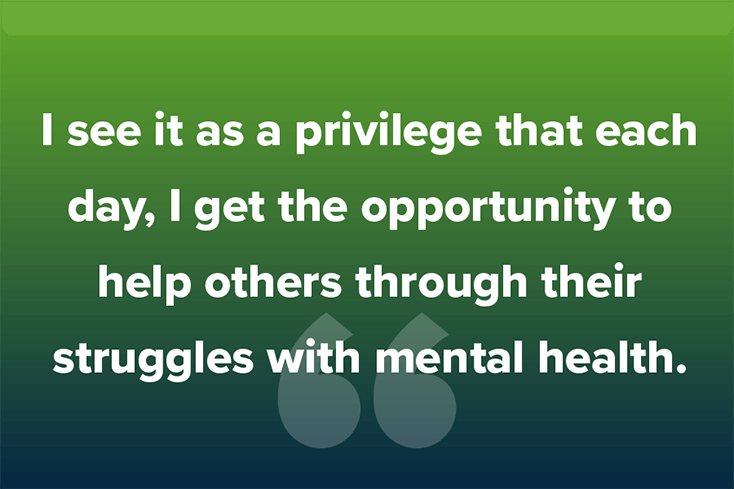September 22, 2022
By Lydia Dobbins
If you or someone you know is experiencing a mental health, suicide or substance use crisis or emotional distress, reach out 24/7 to the 988 Suicide and Crisis Lifeline (formerly known as the National Suicide Prevention Lifeline) by dialing or texting 988 or using chat services at 988lifeline.org to connect to a trained crisis counselor. You can also get crisis text support via the Crisis Text Line by texting NAMI to 741741.

I was seven years old when I first struggled with suicidal ideation. Of course, back then I had no idea that's what it was called. But that pain continued in the form of severe depression and anxiety throughout my childhood. I learned to mask my depression for many years, but I found it harder to mask the panic attacks I started dealing with in my late teen years. My mental health continued to deteriorate, and at age 21, following a challenging year living in a foreign country, I tried acting on my suicidal thoughts — but, thankfully, I was interrupted.
A year later, I finally started counseling and developed some life-saving tools. One of the first steps they had me take was writing a safety plan. As much as I always thought a written plan would be ineffective, the exercise helped me significantly because my plan became a sort of checklist; I had to at least try each thing on my safety plan first before I would let myself make any drastic choices. As I walked through the safety plan when I was struggling, I would often give up on trying anything harmful because I would get distracted by the required tasks, such as getting myself to socialize or spend time in nature.
Now, 20 years after first experiencing suicidal ideation, I have found recovery and my passion. I am a certified recreation therapist. I have worked in psychiatric hospitals and currently work as a case manager for more than 35 people. I see it as a privilege that each day, I get the opportunity to help others through their struggles with mental health. I am currently studying to get my master’s degree in forensic psychology from the University of North Dakota. I hope to go on to pursue a doctorate in clinical psychology.
Looking back, I believe that several things facilitated my recovery: attending therapy, pursuing my passions, embracing my faith and educating my community. As a person of faith, I have learned how spirituality can be helpful in the recovery process. My faith has played a major role in addressing my illness and learning new thought patterns.
This experience has inspired me to advocate for involving spiritual communities in the healing process, and to work to end stigma surrounding mental health in religious communities. Now, I am a big proponent of helping people embrace their spirituality and realize that they have the power to change their thoughts. I believe medication and therapy can be accompanied by love from our communities and the reassurance that we have neuroplasticity and can change the way we think!
I still struggle with the occasional intrusive suicidal ideation. I still go to counseling periodically to deal with trauma, anxiety and depression. I am still learning and growing. Depression is not something that I have completely “defeated,” but I have made enormous progress. Perhaps I will be free from it one day. With the eradication of shame and stigma surrounding mental illness, community involvement and support, and appropriately allocated resources, I believe we can rediscover the wonder of living. That’s my story, at least, and it’s one that I hope can help others as they face their own battles.
We’re always accepting submissions to the NAMI Blog! We feature the latest research, stories of recovery, ways to end stigma and strategies for living well with mental illness. Most importantly: We feature your voices.
LEARN MORENAMI HelpLine is available M-F, 10 a.m. – 10 p.m. ET. Call 800-950-6264,
text “NAMI” to 62640, or email. In a crisis, call or text 988 (24/7).